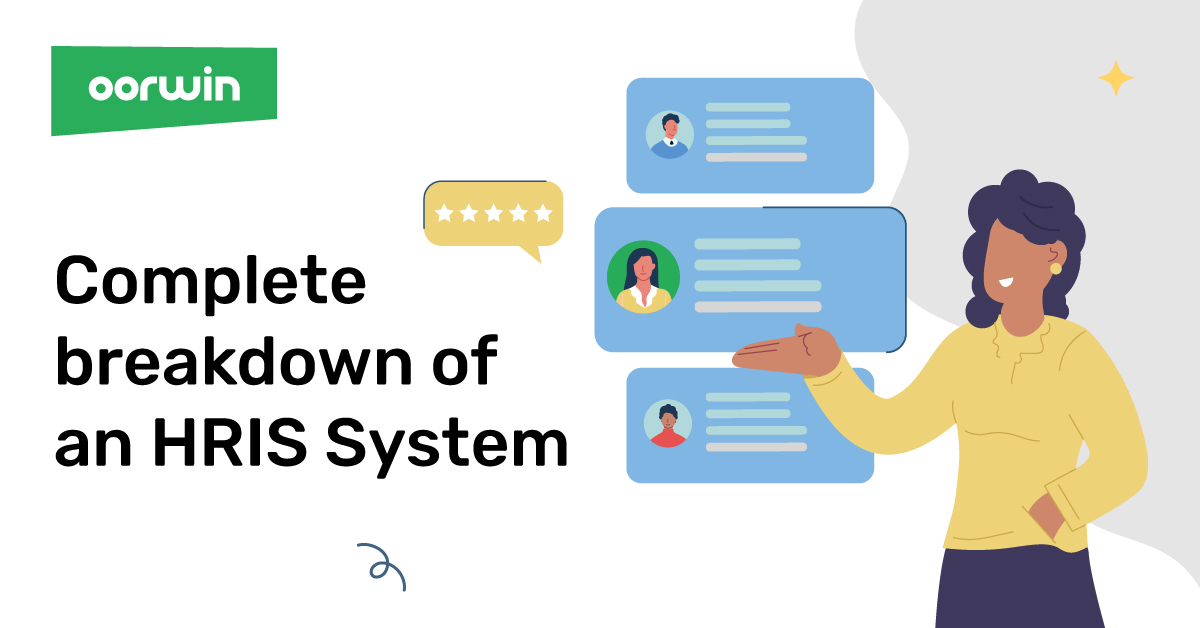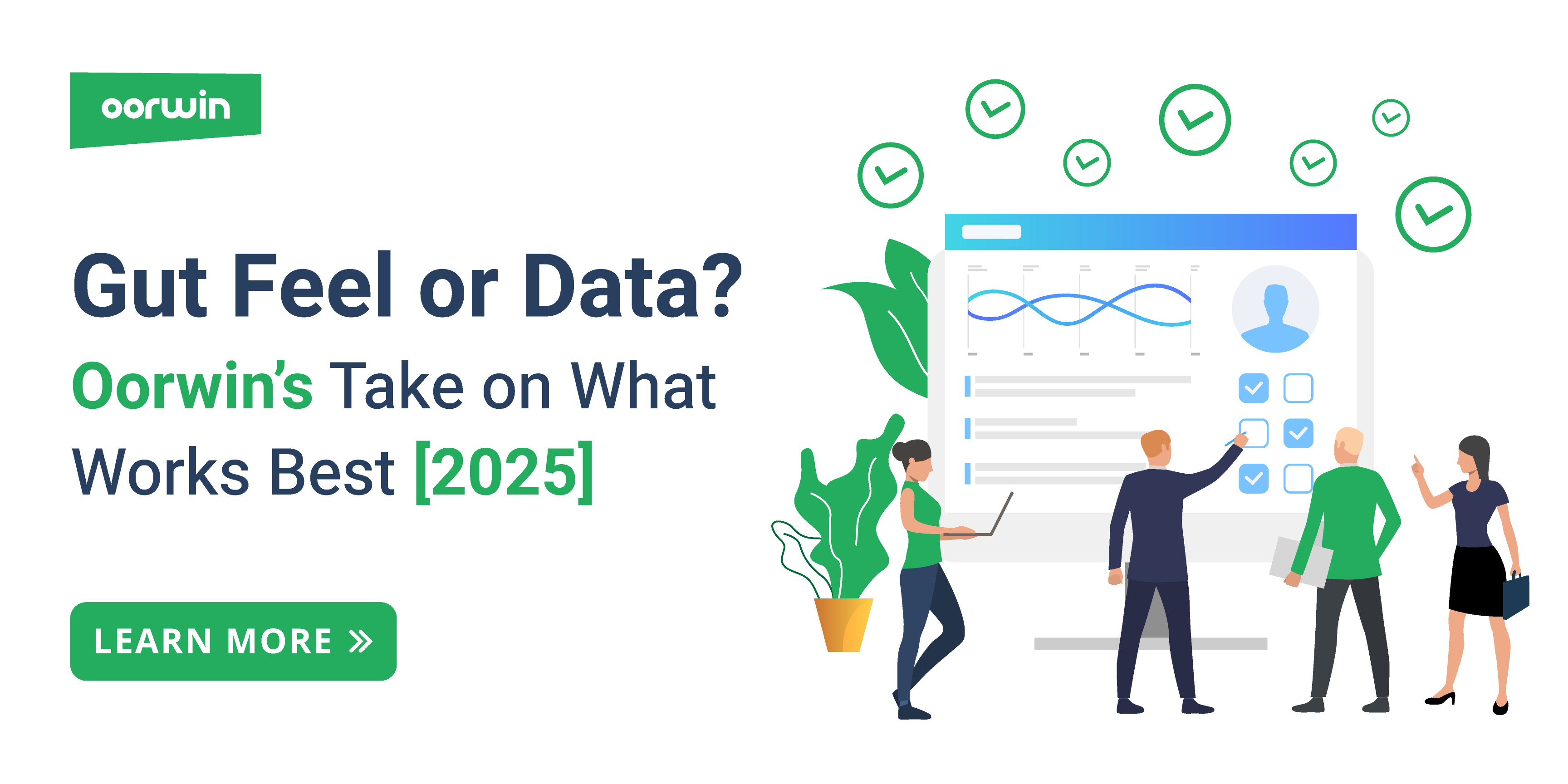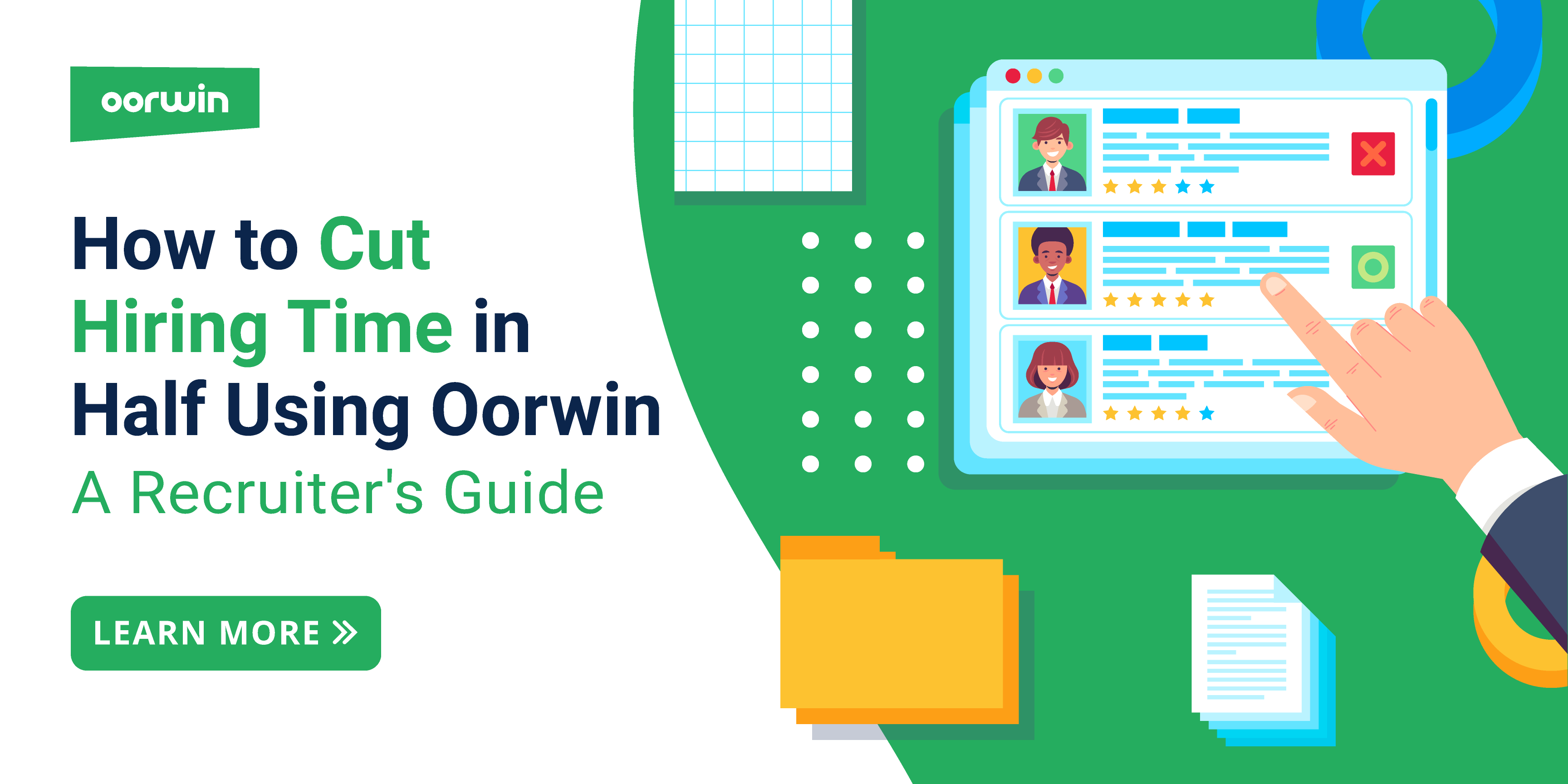What is a HRIS – Human Resources Information System Guide
Oorwin
8min read / 24 Nov 2020

Related Articles
What is HRIS (Human Resource Information System)?
Human Resource Information System or HRIS is a piece of software or an online solution that fulfills all the data, information management requirements of a human resource department. Services normally include things like attendance, payroll, leave and holidays, staff management, employee engagement, as well as various other accounting functions.
One of the main draws of an HRIS is that it allows you to track and maintain data that can be analyzed statistically to inform your business strategy.
Most HRMS are packaged and sold as databases with each one having different functions and capabilities. This makes it incredibly important to pick the right HRMS for your company so that it addresses all your needs and keeps your Human Resource department running smoothly.
And with the cost of a good HRIS running into the many thousands, making sure you get the right one is crucial to prevent you from wasting vast amounts of time and money.
What to look for in an HRIS
Picking the right HRMS for your company can be a stressful task and finding the right options that suit your needs is a challenging prospect.
While a basic HRMS is fairly inexpensive, it is essential to make sure that it meets all of your needs. If you need a specific report then your HRMS will need to be able to run it. If you require your system to create post organizational charts, then there’s no point in implementing an HRMS that can’t create them.
Speaking to HRMS developers can also be an interesting experience as the staff you speak to are often salespeople with targets to meet and little regard for what you need for your company.
With so many factors to think about, it is easy to become confused by the entire process.
To help you out, here are a few things to consider before buying an HRIS:
- Check out multiple sources for reviews and read discussion groups and LinkedIn comments.
- Pick a system that can grow with your business as you expand.
- Make sure that the HRMS works with any other software you already use in your company.
- If your staff has never used an HRIS before then they may need the training to get up to speed.
- Check that the company you purchase your HRMS software from has a good track record for ongoing support and offers an easy-to-contact team if things go wrong.
10 Features of a modern HRIS
A modern Human Resource Information System (HRIS) will provide the following features:
1. Easy management of all employee information
One of the main purposes of an HRIS is to store and manage employee data such as names, addresses, titles, the position at the company, performance history (appraisals), and their salary. It should also ideally contain any medical information about them including their sickness history and any disabilities and medical requirements they may have.
2. Simplified document management
A good HRIS should also provide space for you to store all your business-critical documentation. This can include things like your employee handbook, health, and safety documentation, emergency procedures, sickness policies, and any safety guidelines your company needs to abide by.
3. Remote onboarding, digital signatures
The ability to onboard employees remotely is crucial in the current work environment.
Staffing businesses now need digital signatures for quick approvals and simplified document management with expiry reminders for full legal and immigration compliance.
A modern HRIS helps you do all this and manage the entire employee life cycle with ease from seamless remote onboarding to automated invoice generation and payments.
4. Immigration and legal compliance
A modern HRIS gives you complete peace of mind when it comes to compliance by offering simple immigration document management with expiry reminders. The HRIS also ensures all labor law requirements are met from a job offer, onboarding to contract termination.
5. Benefits and vacation
Ideally, your HRIS will include systems for administering employee enrolment in specific benefits they have access to as well as allowing holiday allocation and booking services. Most good HRIS will provide the option for employees to access this information without having to go through the HR team.
6. Payroll integration
One of the most basic tasks a Human Resource Management System should be able to perform is to integrate with and successfully run payroll services.
To be able to do this it will need to talk effectively with other financial software and accounting systems within your company as well as those in third-party companies when necessary. If your HRMS fails to do this, you may find that employees are not paid correctly or on time and your accounting software may not tally accurately with your actual finances.
7. Track applicants and manage resumes
Over time your business will receive hundreds (maybe thousands) of different applications for a number of different positions. Without a good way of tracking these, you may find that quality applicants slip through your fingers.
A good HRIS should not only allow you to seamlessly store applicant data, but it should also allow you to, with one click of a button, turn them from wannabe employee to actual employee when they are successful (as well as generating any specific data systems required to add them to payroll or send out offer letters, etc).
8. Performance tracking, skill development
Nearly all businesses these days have a form of a development plan for their employees that will allow them to record how they are performing and what their aspirations are.
Keeping these in paper form or in a basic software package like Excel or Word can be incredibly unwieldy and when an employee moves from one role to another, data can be lost. A good quality HRIS should be able to save this information centrally and allow it to be easily transferred across departments when required.
9. Record of disciplinary issues
Without a central record of an employee’s disciplinary history, it can be easy to lose track of who has been warned, who has been suspended, who has been demoted, as well as any other negative actions taken against them. This is especially true when they switch roles or move departments. It may even be useful to keep this record after the employee has left so that references can easily be written.
10. Records of employee training
If you run a business that requires your staff to have specific training, certificates, or licenses, then having this recorded for easy viewing can be vital. Even if training records are not essential for your business, it may be useful to know who has been trained in each area so that staff can be matched easily to roles. A good HRMS should allow this information to be stored and retrieved easily.
Benefits of using an HRIS
A good HRMS will provide your company with a way of storing and retrieving all the information you need to analyze, track, and manipulate data essential to the running of your business. It should provide powerful tools for you to manipulate the information you store for your current employees, previous employees, as well as any applicants who wish to work for you.
Here is a list of some of the key features of a good HRIS:
- An HRIS should provide a decent level of self-service options for staff. A good HRMS can reduce the workload significantly by allowing employees to modify and change data related to them. More complicated self-service tasks may include booking holidays and filling out documents. It may even allow them to enroll in benefits like pensions or apply for other roles.
- Errors made by Human Resource departments can be costly, time-consuming, and cumbersome for your business. They may also lead to legal issues and a negative public perception of what you do. A good HRMS will automate many of the HR team’s tasks, reducing the chance that an error can be made.
- Being able to analyze data effectively and easily is key for any business to understand how it is being run. A good quality HRMS allows HR employees to run a variety of calculations and data manipulations efficiently and quickly. This data can even be stored inside the system to be further analyzed as more information becomes available. Many of the reports that an HRMS can perform can be run automatically when certain criteria are met, such as a specific time and date, saving more time.
- A good HRMS should be able to easily and efficiently run many of the financial management services your business requires. Payroll is notoriously time-consuming for HR teams but with an HRMS many of the more difficult tasks can be automated and changes due to things like employee raising, taking unpaid leave, and promotion can be made with just a click of a button.
Overview of a modern HRIS
A modern HRIS will look very much like a database that can be searched and accessed to bring up information about specific employees. This information should be easy to change and manipulate and anything that is amended should filter through to the rest of the software.
For instance, if your employee changes their address due to moving home, you should be able to access their details by searching for their name and with a quick change of details, the address change will filter through to all parts of the software. It may even generate a letter to the new address to inform the employee that the change has been recorded.
Another example would be when an employee gains a promotion. Again, a quick change on their detail page should filter through the entire system so that payroll and any documentation related to them is amended.
Outside of the basic information storage, an HRIS will also allow the creation of reports. These options should be powerful and allow a range of data to be selected with outputs set to the formats you require.
Having a good quality HRIS is vital for all businesses and can save both time and money in the long run. But it is essential to do your homework before jumping at the first system you come across to make sure it is exactly right for your needs.
Explore G2Crowd top-rated HRIS – HERE
Popular Articles..
Blog

1min read / 25-Jun-2025
Master Effective Interview Techniques with Oorwin: A Step-by-Step Recruiter’s Guide
Blog
Blog
Get the latest Oorwin releases, updates, success stories & industry news
 Back
Back
